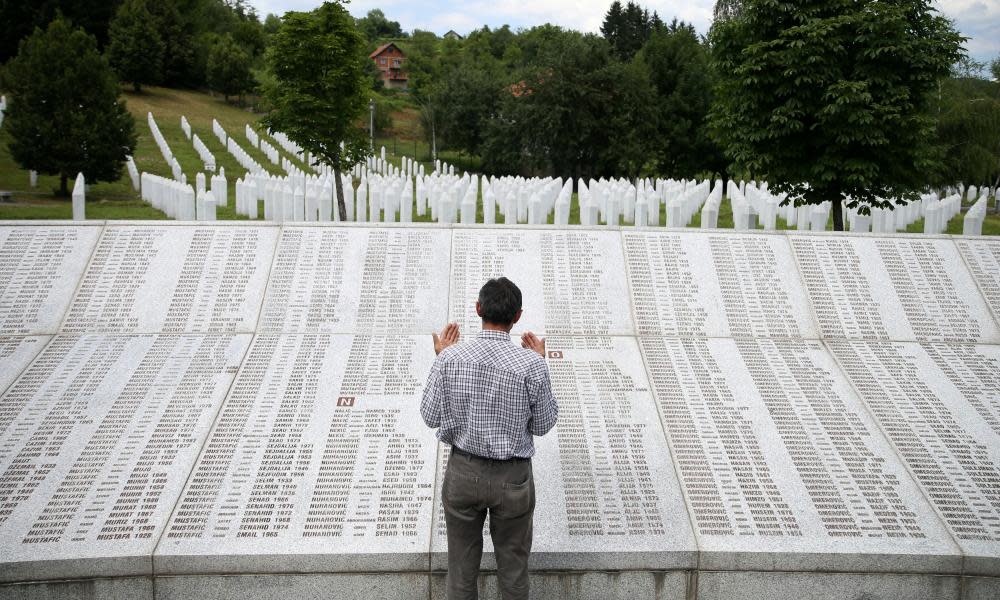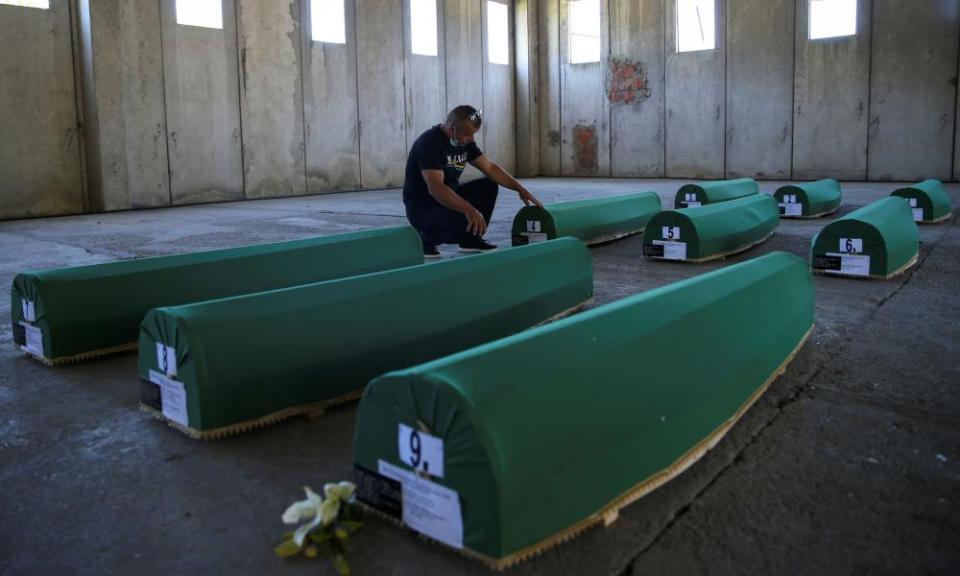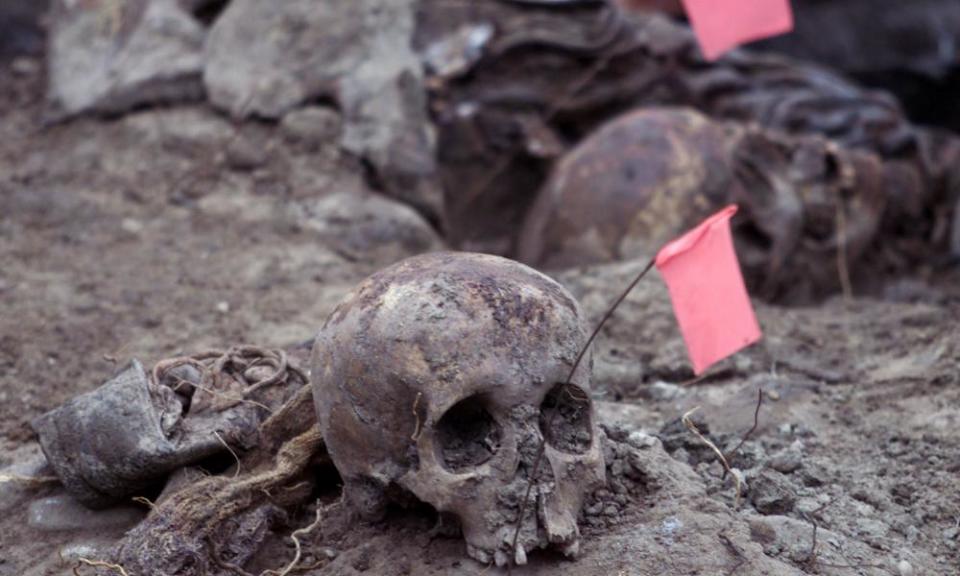Genocide denial gains ground 25 years after Srebrenica massacre

At the genocide memorial centre outside Srebrenica, thousands of simple white gravestones stretch across the gently inclined hillside for as far as the eye can see.
Nearby, over a number of days in July 1995, Bosnian Serb forces systematically murdered around 8,000 Bosniak (Bosnian Muslim) men and boys. It was the worst crime of the Bosnian war, and remains the only massacre on European soil since the second world war to be ruled a genocide.
Even today, remains of victims are still being found and identified. Owing to a cover-up operation to hide the crimes by digging up and dispersing the contents of mass graves, there are cases in which partial remains of the same individual have been found at as many as five sites several miles apart. At a 25th anniversary commemoration on Saturday, at least eight more victims will finally be laid to rest at the cemetery.
A quarter of a century after the events, however, the truth about what happened at Srebrenica is being subjected to a growing chorus of denial, starting in Bosnia itself and echoing around the world, moving from the fringes of the far right into mainstream discourse.

In Srebrenica, the denial starts with the mayor. The current population of around 7,000 is one-fifth of the pre-war total, and there are now more Serbs than Bosniaks, a reversal of the situation before the war and genocide. Four years ago, Srebrenica elected its first Serb mayor, Mladen Grujičić, and official rhetoric changed overnight.
Grujičić, 38, an energetic former chemistry teacher, has no time for talk of genocide. “No Serb would deny that Bosniaks were killed here in horrible crimes … but a genocide means the deliberate destruction of a people. There was no deliberate attempt to do that here,” he said in an interview at his office in the centre of Srebrenica.
He was 10 when the war started. His father was killed during the war in a village not far from Srebrenica. Grujičić pointed out that there were victims on all sides during the conflict, which tore apart multi-ethnic Bosnia after the collapse of Yugoslavia.
But what about the international courts that have forensically sifted the evidence and come to the conclusion that the systematic slaughter around Srebrenica in July 1995 did constitute genocide, unlike other crimes during the war? “Unfortunately, all these courts have been biased against the Serbs and this has only deepened divisions here,” he shrugged. He has not once during his time in office visited the genocide memorial, which is a five-minute drive from the town hall.

His views are in line with those of most Serb politicians in Republika Srpska, the Serb-dominated entity that makes up half of Bosnia’s complicated post-war political system. Milorad Dodik, the Serb member of Bosnia’s tripartite presidency, has called the Srebrenica genocide “a fabricated myth”, and the Republika Srpska authorities have set up a commission to investigate the events. Its report, due later this year, is expected to whitewash the crimes of Bosnian Serb forces.
“This is the next phase, even worse than genocide denial: to try to create a new historical reality,” said Serge Brammertz, who spent nearly a decade as chief prosecutor at the UN international criminal tribunal for the former Yugoslavia in The Hague. The tribunal convicted the Bosnian Serb political leader Radovan Karadžić and the military commander Ratko Mladić of genocide, war crimes and crimes against humanity. Mladić’s appeal is still under way.
The genocide has long been an inspiration for far-right extremists and Islamophobes. The Christchurch mosque attacker last year played a song glorifying Karadžić just prior to the assault, and years earlier Anders Breivik also sought inspiration in the Balkan wars and Serb ultra-nationalism.
Recently, however, questioning the genocide has been gaining more mainstream approval. Most infuriating for survivors was the award of last year’s Nobel prize for literature to the Austrian writer Peter Handke. He had delivered a eulogy at the funeral of the Serbian leader Slobodan Milošević and made a number of revisionist statements about the events of the Bosnian war that bordered on genocide denial.

In a press conference before the prize-giving ceremony, when Handke was asked whether he accepted that the Srebrenica massacre had happened, he dodged the question, calling it “empty and ignorant” and comparing it to hate mail he said he had received containing soiled toilet paper.
Emir Suljagić, who runs the sombre genocide memorial centre at Potočari, just outside Srebrenica, said: “I am not a fan of cancel culture but if there’s one thing that should cancel you, surely it’s genocide denial, it’s speaking at Milošević’s funeral.”
The memorial centre is located in the former headquarters of the Dutch UN battalion that in July 1995 failed to protect the people gathered in Srebrenica, which had been declared a UN safe zone. Suljagić, who survived because he worked as a translator for the mission, spoke of the trauma for returnees who have to live in places where the crimes took place. He told a story from his years working as a journalist, covering war crimes trials in The Hague.
Suljagić was watching two former Bosnian Serb soldiers give evidence against their commander at one trial. The men testified under pseudonyms and with their voice and appearance altered, but as they recounted their role in a massacre, Suljagić pieced together their identities from information given to the court. He had been to school with both of them. He assumed they had been given immunity for their role in the massacre in exchange for testifying against their commander.
“Nine years later, I’m in the parking lot of the local supermarket and one of those guys comes out and recognises me and says: ‘Hi, how are you doing?’ They both live locally. And I’m thinking: ‘Do I tell him? Do I tell him I know?’ In the end, I said nothing, but I still see them occasionally.”

With survivors and perpetrators living side by side, and given the country’s divided politics, it is hard to imagine closure and reconciliation coming soon. Hasan Hasanović, who lost his twin brother and his father in the genocide, said it would be possible to talk about progress when school trips of Serb pupils come to tour the genocide memorial, where he works as a guide.
Schooling, like so much in Bosnia, is still divided along ethnic lines. Pupils are split into separate classes for “national subjects” such as history, and while the Bosniak textbooks cover the genocide, the Serb textbooks gloss it over. There is little hope of a unified curriculum in the country in the foreseeable future. “The main nationalist parties that continue to benefit from social division have no interest in changing a divisive status quo,” said Valery Perry, of the Democratization Policy Council in Sarajevo.
At Srebrenica’s elementary school, teachers avoid discussing the war at all, said the headmaster, Dragi Jovanović. “Even adults, when we sit together, we simply do not touch these topics ... We are trying not to hurt people’s feelings, and at this point you can’t educate the children without hurting their feelings,” he said.
How, then, would he respond to a pupil who asked why there was such a vast cemetery on the outskirts of town? “I have never been asked such a question,” he said.


